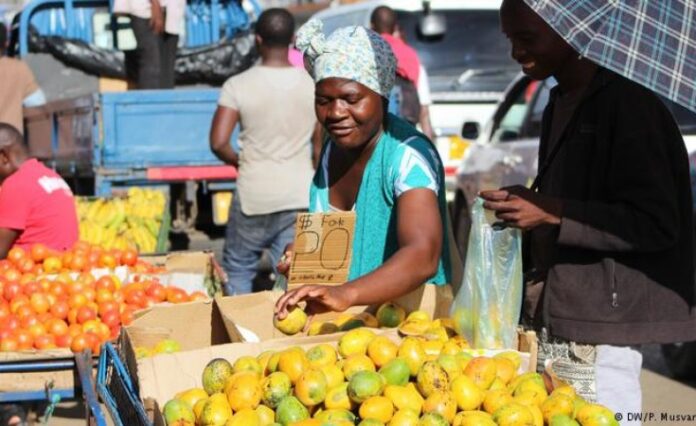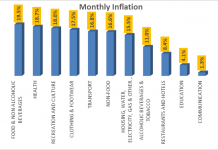Margaret Chinowaita
WINNIE pushes second hand clothing at Jambanja Market in Chitungwiza, a dormitory town, 25km from Harare. She has to secure the bales from Mozambique hoping nothing goes amiss until her order lands for sale at the vibrant market.
Her daily living depends on the informal market amidst the raging spike in infections from COVID-19.
Shaking her head, she spoke of real fear of COVID-19. With no choice, it is a do or die situation, she faces grinding poverty.
She has three children to feed and send to school. Her husband, who used to work at a restaurant in town, was retrenched as restaurants have been one of the sectors negatively impacted by the Covid-19 restrictions.
“My life is difficult. At one time, I would walk with a group of women at 12 midnight, from where I stay and set shop. The market would fire up at that wee hour until around 8am, teeming with customers and vendors. We would pack our things and go home at around 9am. This was done to beat the COVID-19 lockdown deadline and to do away with the police. Police had become a menace, chasing us and at times arresting us.”
Life became unbearable for Winnie, who refused to give her full name. She bared her heart out in the interview, she was afraid of contracting the dreaded virus. Every day, she gazes at customers and other vendors who do not have masks. She sees the risk that she is in as customers and fellow vendors have a low risk perception.
Winnie said, “I heard about vaccinations and I am willing to get a jab. I wish we were also regarded as frontline workers because the market drives the economy of Chitungwiza. I will take time to get vaccinated at our clinic. Recently people have been sleeping at the clinic, sadly, the clinic has a limited number of vaccines, so not everyone who makes the midnight wintry night is assured to get vaccinated.”
ELIGIBILITY
In February 2021, the Zimbabwe Government started a campaign to vaccinate citizens from COVID-19. The programme started off with the vaccination of frontline workers such as nurses, doctors, uniformed forces, teachers and people suffering from chronic illnesses and the elderly. Demand was low as vaccine hesitancy saw many sitting on the fence playing a wait and see game. With a possibility of the vaccines going to waste, the programme opened to everyone above 18 years in April.
STATS ON RECIPIENTS
The latest Poverty, Income, Consumption and Expenditure Surveys (PICES) report released by UNICEF stated that the results from the round three surveys focusing on Zimbabwe revealed that about 63 percent of the respondents will definitely get the vaccine if available free of charge, while another 21 percent said they were likely to get the jab. The remaining 16 percent of respondents stated that they will not get the vaccine or that they were unsure if they wanted to be vaccinated.
It is envisaged that the pandemic will ultimately be brought under control after herd immunity is achieved through mass vaccination.
VACCINATION DRIVE
Director of Health Services for Chitungwiza, Dr Tonderai Kasu, spoke to me on vaccination and a plethora of challenges faced by Chitungwiza residents, and vendors in particular.
Chitungwiza City Health department has been providing free testing for COVID-19 in all Council clinics and has also been providing free vaccination against COVID-19 in all its health facilities.
Besides the vaccination campaign, the council has been raising awareness on prevention and has a response team tracing exposed people.
“Chitungwiza council is busy on the ground dealing with COVID-19. Also, as part of COVID-19 control and response, the City Health department has been conducting case based surveillance and contact tracing; and we have had rapid response teams working on the ground. We have been conducting disinfection for premises and supervision of COVID-19 burials. We have had several rounds of training for our staff, and we have been conducting COVID-19 awareness campaigns in the community,” said Dr Kasu.
To ensure order at the market places and vending sites, Chitungwiza Town Council has been working with the Zimbabwe Republic Police and the Municipal Police to enforce the COVID-19 regulations.
SHORTAGE OF FUNDS
Dr Kasu said, the council has received some funding from the Central Government through the Ministry of Health and Child Care, however, this funding has not been adequate to meet the growing challenges.
“We have received some funding from the Central Government through the Ministry of Health and Child Care, however, this is not enough. There are many funding gaps that remain unmet in our work. For example, we have not been able to complete renovation and refurbishment works at our Seke South Clinic so that it can be ready to become our dedicated isolation centre for Chitungwiza COVID-19 patients. Due to lack of capacity to raise adequate funding, we have not been able to procure ambulances for the City Health Department and this has negatively affected our community, there is no affordable alternative for anyone in need of the ambulance service. We also require additional funding in order to cater for more vehicles and fuel for our rapid response teams so that there is a more effective COVID-19 response,” said Dr Kasu.
STAFF SHORTAGES
The Council, like many other health centres has lost staff in search of greener pastures.
“Importantly, we need funding support in order to be able to cater for the welfare and remuneration of our health staff. We are now severely short-staffed due to many of our health professionals resigning and leaving in large numbers due to inadequate and poor remuneration. The poor remuneration has resulted in our inability to attract and retain health professional staff.
“This is evident, given that for the current COVID-19 vaccination campaign; we have been so constrained by staff shortages, limiting the numbers that we have been able to reach with vaccination.
Besides COVID-19 vaccination, our staff still carries out the normal duties hence they burn out. We are working with skeletal staff.
Our numbers for vaccination could have been much better had we had adequate staff to perform this work. I call upon and appeal to the Central Government, as well as our donors and development partners, to lend financial support to the Chitungwiza City Health department’s staff and the department’s COVID-19 response effort.
“So far, since the beginning of the COVID-19 vaccination campaign, 31 102 people in Chitungwiza have received their first dose of the vaccine, and 14 210 people have received their second dose, ” said Dr Kasu.
RETRENCHMENTS
With formal employment retrenchments on the rise, the informal sector numbers keep swelling as it is survival of the fittest. This has seen the vendors taking steps to engagement and grow the sector.
Vendors Initiative for Social and Economic Transformation (VISET) director Samuel Wadzai speaks on his organisation’s engagements amidst the pandemic. Similar organisations are ensuring their members access the vaccines as it is a sure way to prevention.
“Vendor’s organisations across the county are working with their members to ensure safety and vaccination during COVID-19. With a membership of 68 000, 34 335 being women and 33 665 men, we value prevention so we urge our members to observe all the safety requirements and strengthen the prevention with the COVID-19 vaccine,” Wadzai said.
Wadzai said numbers of vendors in the country keep growing as citizens are being forced out of formal employment. VISET has a heavy presence in Harare, Chitungwiza and other towns across the country. It recently acquired new chapters in Zvishavane and Gwanda.
WOMEN BEAR BRUNT
Women traditionally shoulder the burden of domestic care and unfortunately under COVID-19, the inability to trade normally affecting incomes was exacerbated.
Married women whose husbands were formal employed had the extra burden of becoming the sole bread winners when their spouses were stopped from going to work, in some instances with half pay or none.
With lockdown, violence in the homes increased. With nowhere to report owing to restrictions after curfew, some abuse cases went unreported.
Some clinics had other services on hold in 2020, citing staff shortages and the need to focus of COVID-19. With one seeking services for other ailments, a COVID-19 test was asked for in order to access the usual services. Unplanned and at times, unwanted pregnancies were on the rise as women failed to obtain contraception and condoms.
Traditionally, VISET membership was drawn from the poor and middle-aged category, however, lately, even those in the middle income bracket have joined the bandwagon as evidenced by the growing number of car boot traders.
INTERVENTIONS
VISET has been involved in many initiatives that seek to alleviate the plight of vendors since the advent of lockdown measures in March 2020.
“We have collaborated with local authorities in major towns and cities under the Economic Governance Initiative (EGI) to provide personal protective equipment, information materials on the pandemic. We formulated an informal trader health pledge to ensure vendors adhere to World Health Organisation (WHO) protocols in the conduct of their business in the marketplace. Under the Oxfam initiative, we were able to be a part of their global Vaccine Access To Information (VATI) campaign that amongst other objectives sought to ensure greater access to vaccines for poor countries,” Wadzai said.
ATTITUDES
VISET has been on record urging members to take up vaccination coming up with virtual awareness forums.
“In line with this we came up with a WhatsApp based survey to identify attitudes amongst informal traders on vaccination to assist the Ministry of Health and Child Care in coming up with better targeted interventions. We are glad that the recent decentralised vaccination programme in Bulawayo was part of our lobbying efforts, the mobile clinics are coming to the vendor markets,” Wadzai added.
On enquiring what the future held if the pandemic was to persist, Wadzai appealed for the social security net to cover their marginalised sector too.
“Despite many public pronouncements and policy papers, our membership has not been recipients of the Government grants that were targeted for the informal sector.
“The future is bleak as the sector, not only has to contend with no social security support from Government, it is also faced with demolitions of their marketplaces. The continued closure of borders is also hindering operations of those reliant on cross border trading,” he bemoaned.
VISET continues to hold awareness campaigns on the need for informal traders and the nation at large to take up vaccination in order to achieve herd immunity. We have also been lobbying for Government to come up with social protection schemes for the informal sector.
SATELLITE MARKETS
VISET urges local authorities to speedily develop satellite markets that are closer to communities so that women are not endangered as they have to wake up in the early hours in order to commute to buy produce. Compounded with the water shortages, women face hardships on all fronts as they also have to fetch water in the cities where water is expected to run from the taps.
“There is also need for better provision of water to residential areas to ease the burden of having to first source water before leaving home very early to buy produce for resale, the business day for women begins way before everyone else wakes up,” Wadzai shed light on the schedule.
SEXUAL OBJECTS
As if the challenges were not enough, women were viewed as sexual objects by some of the arresting authorities.
“The issue of harassment and in some instances, loss of wares to municipal police was compounded with some seeking sexual favours on a daily basis. We call on law enforcement authorities to train their officers to be gender sensitive. We urge abused women to report those officers who harass or intimidate them, no one is above the law,” he urged.
With the reporting channels clear at police stations or councils, some women still fear the outcome were they to report, so many abuse cases go unreported. Either the women facing abuse may be blamed as being loose themselves. It is still a long road to parity for women in the informal business sector as well as community at large, to be equal to the male counterparts.
The funding source of the work produced here was made possible by WAN-IFRA Women in News Social Impact Reporting Initiative. We recognise that the content produced reflects the author’s views and not those of the funder.




















